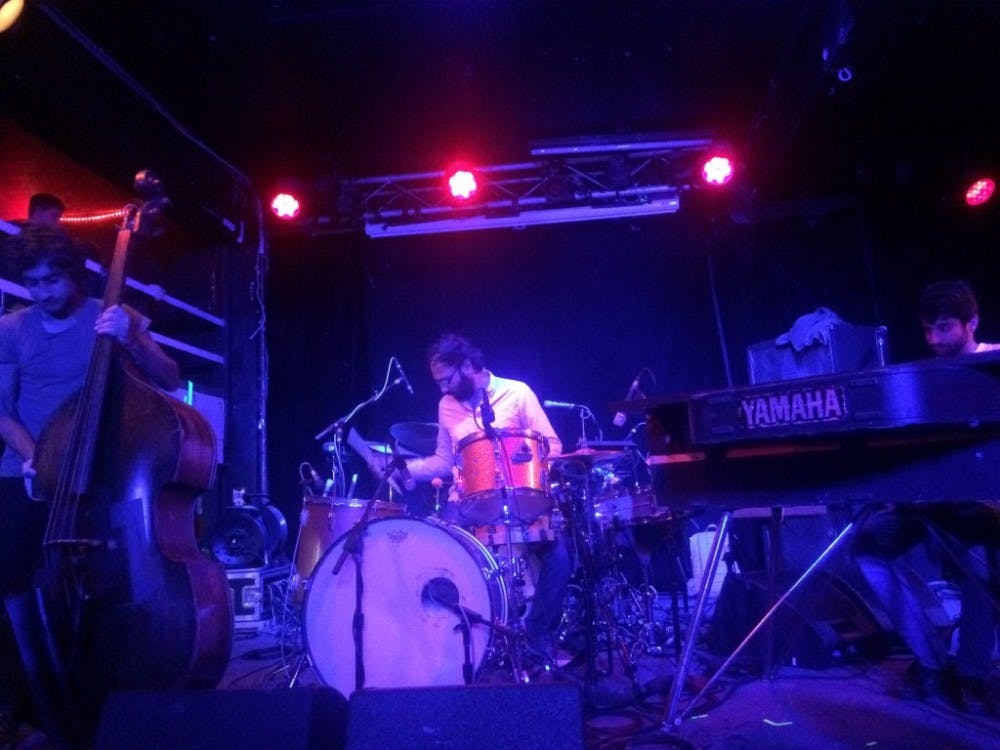Last Sunday, Son Lux headlined a show at the Ottobar. Son Lux is a genre-bending American musician whose work might be described as experimental electronic, pop or just “indie.” Ryan Lott, the man behind the act, has released four albums, including Bones, We Are Rising and Lanterns, as well as two EPs under Son Lux.
He also performs in the hip hop group Sisyphus, a collaboration between several artists including Sufjan Stevens. He has scored the soundtracks of several films, including Paper Towns (2013). Lott’s most recent album, Bones, was released on Glassnote Records in 2015.
Dawn of Midi was the sole opening act for Son Lux, and they certainly did not need any help setting the stage for the show. Dawn of Midi provides solace in a popular music landscape in which the modus operandi is moving past a pseudo-ironic, angsty and apathetic caricature of humdrum three-chord drum and bass.
Picture the punk trio Minutemen, for example, clad in their little button-up plaid shirts and doing aggressively comical facial expressions, their words completely and utterly unpretentious with a feel for the avant-garde that blossoms in their open chests. This disposition is seldom seen in music that is viewed as “moralistic” and whose expressiveness originates from its artistic integrity.
Dawn of Midi provides the same air of introspection by playing as few notes as possible. Their sound has a sort of heightened self-awareness.
By opting to play with a paucity of instruments and notes, they’ve deliberately constrained on their music. The effect is clearly audible; There is a kind of creativity in establishing mercurial rhythms and three-note melodies when the constraint is self-imposed. Their toolbox recalls that of a traditional jazz piano trio.
Dawn of Midi is a formidable live band, since they are experts in playing music that is aware of the gaps in its space. They manage to fill in these gaps with coalescing rhythms from a ploddingly simple palette of effects. There is something ironic about a band that imposes restraints on itself and, in the process, discovers more possibilities with the form.
There is nothing too particular in way they play their instruments. Despite this, it really is notable that band members Aakaash Israni, Amino Belyamani and Qasim Naqvi alter their instruments only via intertwined rhythms as the speed of all three instruments break apart and come together in a wavelike pattern.
Dysnomia, their second album, was released in 2013 on Thirsty Ear Records, and recently their live show has become a performance of the album in its entirety.

Unlike in their first album, Dawn of Midi was incredibly meticulous about the timing and structure of their performance. Down to each clap of drum stick to maple bass drum shell, all the functioning pieces of their performance come together entirely rehearsed and on the dot.
Their set at the Ottobar on Sunday was highlighted by the fact that they were opening for the band Son Lux, an established electronic indie pop band. The crowd was small, but it was clear that the majority of those listening were aware of the band’s discography.
Sophomore Will Scerbo who attended the concert and commented on the speed at which the band played. While their performance itself was different from their album, in concert they did not falter at speeding up their already complex rhythms and maintained a sense of cohesiveness.
“[Dawn of Midi] was playing at double speed as they had to fill the entirety of the album’s ideas into the 45 minutes they were allotted,” he said.
It is nearly impossible to pinpoint the exact time signature that the band is playing at, but the switches do not deter from the fact that Dawn of Midi plays incredibly dance-able music that is novel in its execution. Unlike other jazz trios, they have circumnavigated the labels by appealing not to free-form jazz interpretations but by creating universally driven and self-sustained music.





